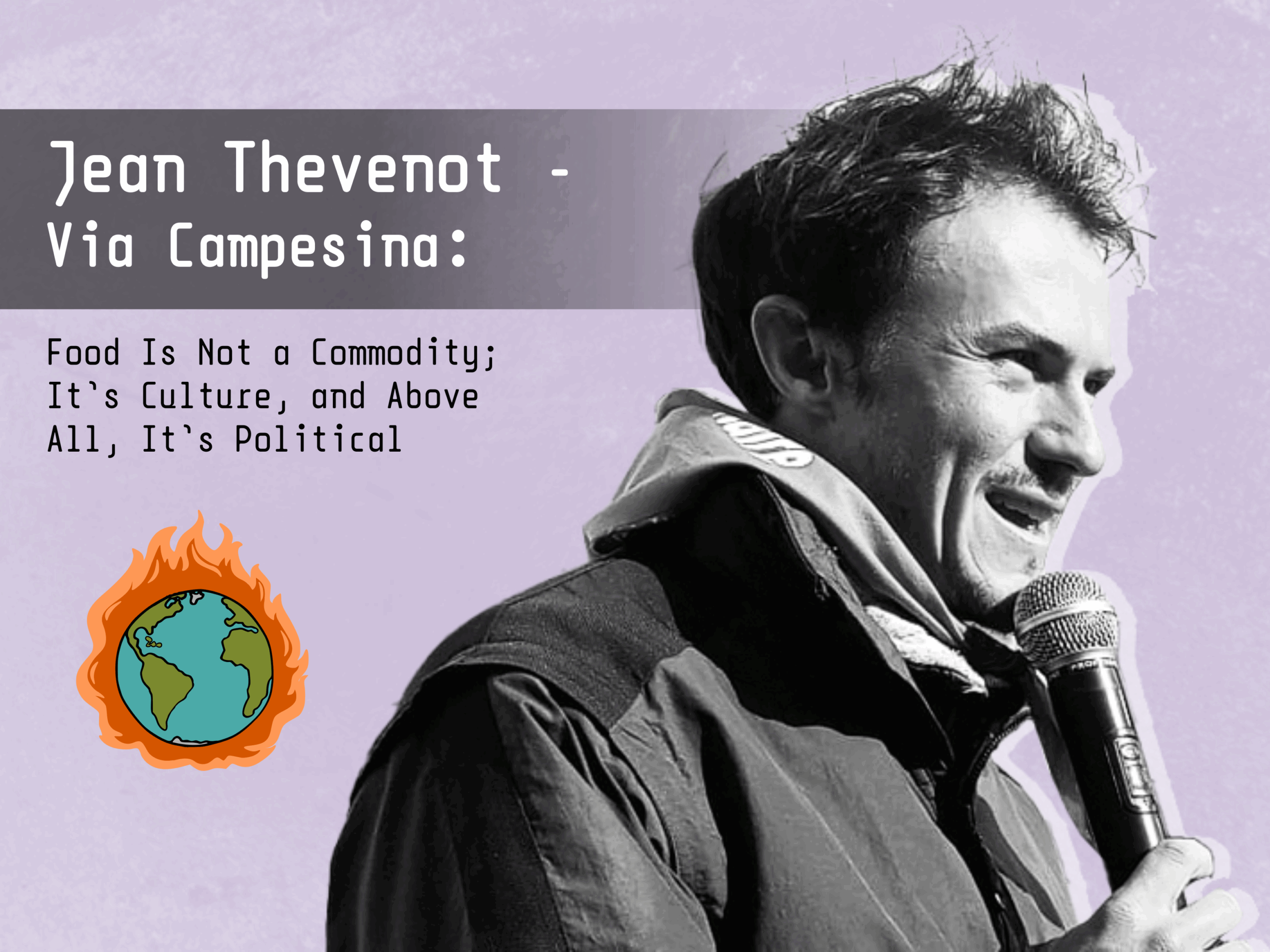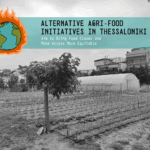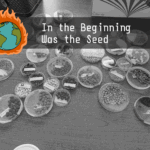What is food sovereignty? What does it mean to defend farmers’ rights while also fighting for agriculture that respects nature and the environment? A global movement founded in 1993 out of the struggles of farmers, landless laborers, Indigenous peoples, herders, fishers, migrant farmworkers, rural women, and others continues to lift up the voices of small-scale food producers and their struggles amid rising inequality, limited access to resources, and the devastating impacts of the climate crisis. Jean Thévenot, a farmer in the Basque Country, an organic seedling grower, and a member of Via Campesina’s local affiliate “Confédération Paysanne,” speaks to Alterthess about the need to shift to an agroecological model grounded in the decisions of small farmers, one that enables them to work with nature rather than destroy it.
We began by asking Jean Thévenot to tell us a little about himself and Via Campesina’s work.
I’m a farmer. Via Campesina is one of the largest social movements on the planet today. We have over 200 million members around the world, in Asia, Africa, South America, Europe, etc. The movement is organized by regions. There is international coordination, but most of the work happens at the regional level. In my case, I’m part of the European region, based in Brussels. Ten people work there, and we have 32 member farmers’ organizations. Some are very large; some, of course, are very small. Our main work is to advance farmers’ demands and rights. We fight for everything related to agriculture: access to land, generational renewal, fair prices for farmers and consumers, agroecology, transforming the farming model, the fight against GMOs, and so on. As a farmers’ movement, most of our representatives are in fact farmers, like me. At the same time, I’m responsible for monitoring climate-related issues.
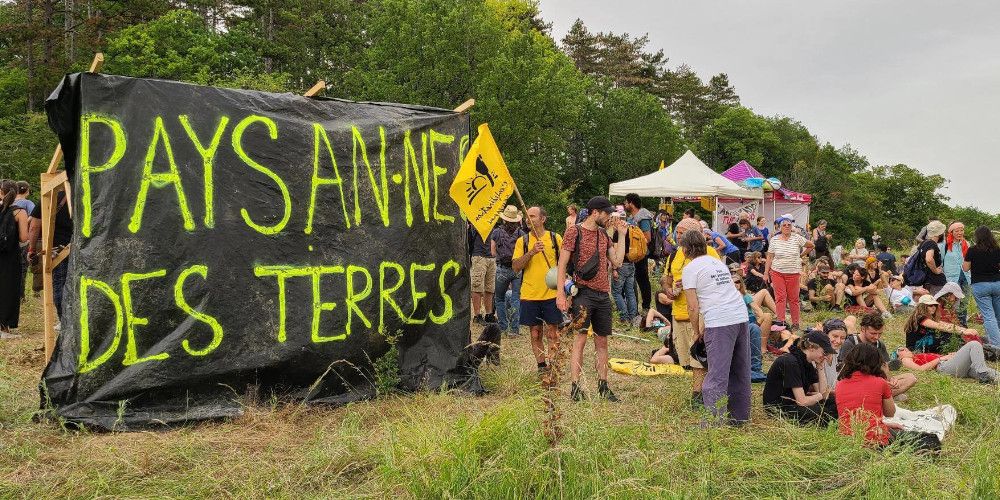
What is Via Campesina’s position on agriculture and nature more broadly?
That’s a difficult question. I’m not sure that, as ECVC, as Via Campesina, we have an official position on this exact topic. But I’d say our general stance is that agriculture and nature are the same thing.
Basically, we don’t agree with the idea that, for example, we should have some protected areas with no human activity and, on the other hand, very industrialized zones with highly productive industries or agriculture. We believe places must be alive. And in every place we need agriculture. We need a bit of everything for a place to be vibrant. And of course we care deeply about the environment, because we work with it every day. But we believe most environmental decisions and processes must include farmers, not exclude them from protected areas, but help them transition to a model where they can work with nature instead of destroying it. This is what we in Via Campesina call “peasant-based agroecology.”
In recent years many terms have cropped up, permaculture and others, that don’t really have firm definitions. People can interpret them however they like. For example, right now we’re fighting something called “regenerative agriculture,” which looks very good on paper, but in reality is being pushed by huge industrial corporations like Unilever, Nestlé, and others. It’s just tidy “greenwashing.”
So we have to navigate all this, because some solutions and proposals are genuinely good, while others are largely controlled by corporations and serve a more capitalist and financial agenda rather than an ecological one. That’s why we decided to articulate the term “peasant-based agroecology,” which is very important because it emphasizes that it comes from farmers for farmers, not imposed by external actors. And we also speak of agroecology because we truly want to work with nature. So that, I think, is our perspective.
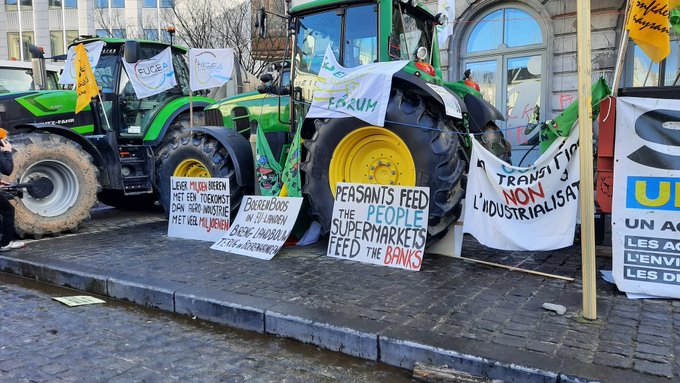
In your view, what are the real impacts of climate change on agriculture? How big is the threat to food sovereignty?
Climate change is both a problem for farmers and a result of industrial agriculture. The dominant agricultural model today is industrial agriculture. In Via Campesina we always remind people that, globally and in Europe, most farmers are still small-scale, using environmentally friendly practices. By contrast, industrial agriculture, in terms of the number of farms, is very small, but it controls vast tracts of land. That’s why it ultimately seems like industrial agriculture is huge, if we talk in terms of area. But not if we talk in terms of people. And indeed, this industrial model not only destroys the climate; it also degrades water resources, pollutes with pesticides and chemicals, and consumes enormous quantities of non-renewable resources, not only oil, but also natural gas (for fertilizer production) and other non-renewable chemical inputs.
So it’s a serious issue that must be addressed. And at the same time, climate change is already affecting most farms very severely.
We’re quite fortunate in Via Campesina to have an international network, so we can connect with farmers in the Global South. To be honest, right now the main impacts of climate change are found in the Global South, major floods or droughts with very severe consequences occur mostly in Africa, Asia, and South America. But now they’re reaching Europe as well. Greece is a good example, you had huge floods a few years ago. The same in Slovenia, Spain…
We’re seeing more and more extreme weather events. And, of course, farms are the first to be hit, because when such events happen, farms are often completely destroyed or lose everything. For a small farm it’s extremely difficult to recover from that without state subsidies or assistance.
And if we talk about food sovereignty at the local or even national level, such events make it almost impossible, because if all the crops are destroyed, then you depend entirely on the market for food. This is something we fight for in Via Campesina. We believe every place, every country, should be able to produce the basic dietary needs of its population. Dependence on the international market is very risky because prices are volatile and imports are complicated.
Do you think agriculture is being overly blamed for the climate crisis?
No, I don’t. We work closely with a research center called Grain. They carry out many studies and clearly confirm that industrial agriculture is now a very significant source of CO₂ and other emissions. That’s the problem. Agriculture mainly emits other greenhouse gases, especially nitrogen compounds, which have an even greater impact on climate change than carbon dioxide.
And certainly, industrial agriculture releases huge quantities of these molecules into the atmosphere, that’s a given. We also know that industrial animal production, like large-scale poultry or pig farming, has an enormous environmental footprint. So yes, we can’t say otherwise. That’s science. It’s a fact.
The question is how we deal with it. And here is where Via Campesina disagrees with certain approaches. Some say we need even more industry in agriculture so we can produce more food on a smaller land base. That’s one approach. But we don’t think that’s a good solution. Instead, we believe we need many small farms that rely more on human labor and less on machines, and that, as I said before, work with nature to produce food, rather than depending on chemicals and external inputs. So yes, it’s true that agriculture has a big role to play. The question is: which agricultural model do we want? We support a model with as many farms as possible and with as much diversity of production as possible. And that, essentially, is food sovereignty.
In fact, the term “food sovereignty” was created by Via Campesina in the 1990s. We were the first organization to speak of food sovereignty rather than food security. Food security deals only with numbers, and we felt that wasn’t enough. We can’t count only calories.
Take Denmark as an example: it has food security because it produces enough food calories for its population. But if you look at what it produces, it produces almost only milk. You can’t feed an entire population solely on milk, that’s not realistic. So a place can have food security but lack food sovereignty, and still import many products. In our definition of food sovereignty we include concepts like democracy and citizen participation, so that we can have a food system that is fairer, more equitable, and, above all, locally adapted, meaning that crops suited to each region and its local population are cultivated.
What do you think of the European policies to tackle climate change?
I’d say they’re almost frightening. The European institutions, but the same is true internationally, basically the very actors responsible for climate change are trying to convince us they have the solution. We believe that’s not possible. Industrial agriculture is the problem. And whatever changes you make, even if you use GMOs or other technologies, the outcome will be the same, because this model is built on profit.
By contrast, the family-based model of food production that we defend in Via Campesina is not profit-driven. Its goal is to feed people. That’s the fundamental difference. And we believe that’s where we need to focus.
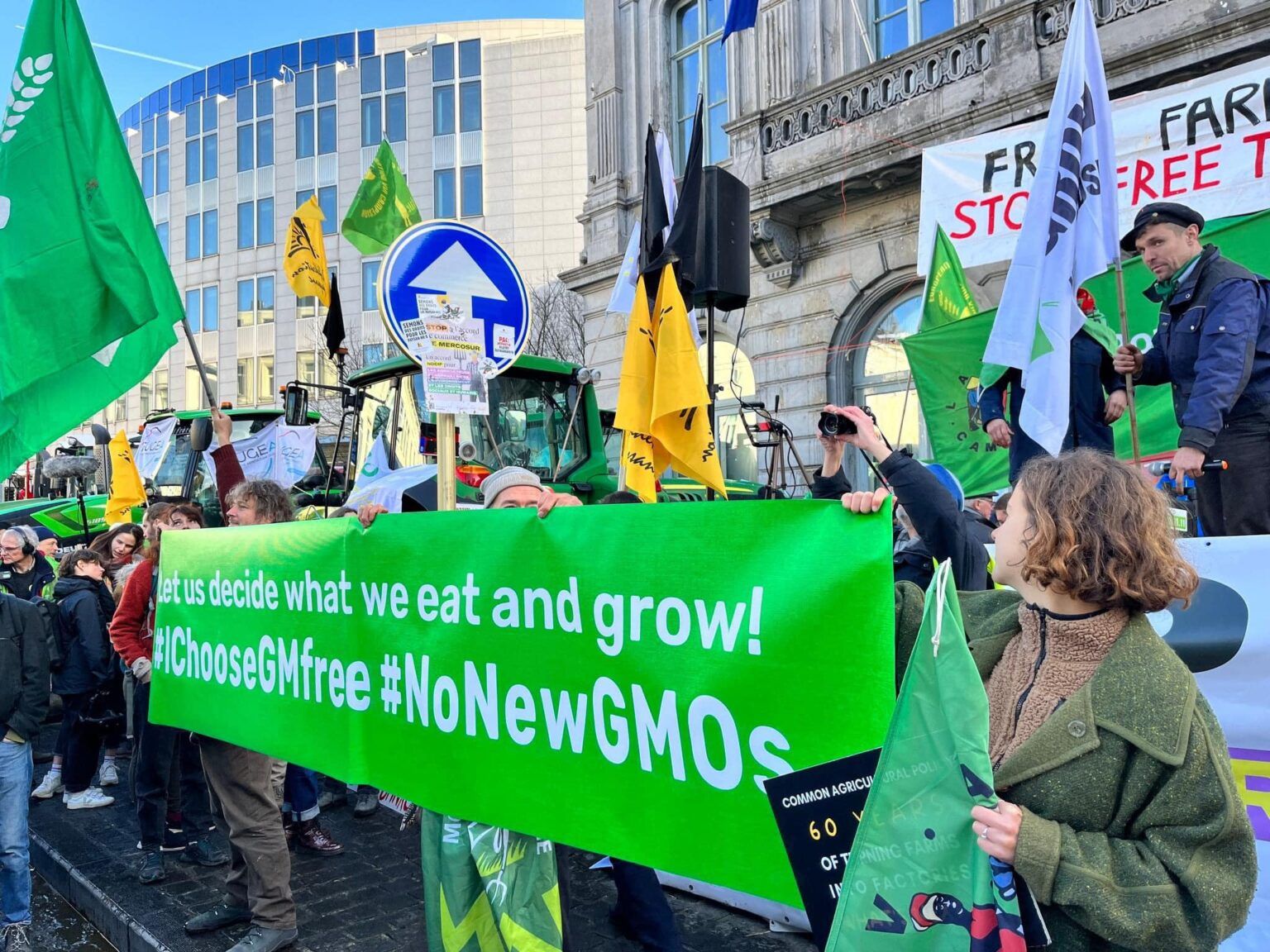
As for GMOs, we are categorically opposed. Via Campesina is among the best organized farmers’ collectives in Europe fighting GMOs. I think that thanks, in part, to the work of our colleagues in Via Campesina’s seed unit, we’ve managed to block the proposal for new genomic techniques (NGTs) that the European Union is promoting. They say it’s for the climate, but we haven’t seen a single crop developed that relates to climate resilience. Most are pesticide-tolerant or produce their own pesticide—and in every case there’s a patent. So this is about profit, not the climate.
In reality, we already know the solutions. We know how to farm in an environmentally friendly way. We need fewer chemicals, more manure, fewer synthetic fertilizers. And we always stress that we cannot stop raising animals and consuming meat. Livestock, in balanced systems, is essential. In the past, farms had both crops and animals. Part of the crops went to the animals, and the animals provided manure for the fields, it was a cycle. And we’re trying to bring that cycle back.
In our view, the problem isn’t technological. It’s not about finding magic fixes like GMOs, drones, or AI-equipped tractors. All that is nonsense. The issue is philosophical: How do we conceive of agriculture? We need to restart from the soil. In industrial agriculture, soil is just a substrate to drop a seed into. But soil is a living organism. And that must change at the root.
So you are talking about a different farming model?
That’s exactly what we support: a climate-friendly farming model. The Green Deal, at least the part that concerned agriculture, the “Farm to Fork” strategy, has been abandoned by the EU. And that’s a pity, because it had some good points. Now it has been replaced by other initiatives, and in the climate domain the main tool is the CRCF, the Carbon Removal Certification Framework. From the beginning, we at Via Campesina have fought this proposal together with other allies through the Really Zero Europe platform. We believe the model is wrong. Essentially, it benefits large farms.
Small and medium-sized farms that already use good practices and store a lot of carbon in the soil have little room to offer additional storage, and therefore will not benefit. By contrast, industrial farms that have destroyed the soil can “fix it a bit” and then sell carbon for money. So, in essence, it’s a system that enriches the very farms that already damaged the climate.
What we propose in Via Campesina is a carbon tax. The state should tax polluting businesses and use those funds to support farmers in transitioning from industrial agriculture to agroecology. This can also be done through the Common Agricultural Policy (CAP). The CAP already exists, but right now it props up industry. It could, however, be used to help new farmers start out and to support the transition.
And something very important: we don’t want to leave anyone behind. Even those small and medium-sized farmers who turned to industrial agriculture for economic reasons, we want to help them return to more sustainable practices. We’re not abandoning them. We want to change the system for the benefit of both people and the environment. Unfortunately, I must admit that at the moment most EU proposals on climate and agriculture are not good solutions.
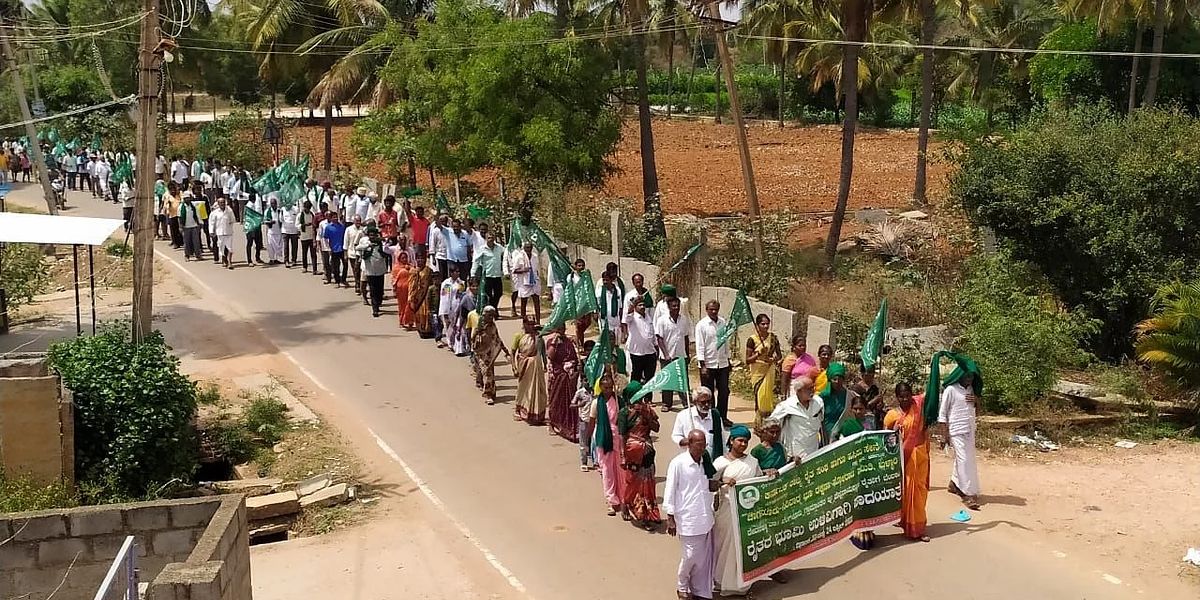
Can you explain more what carbon farming is, and specifically whether it leads to loss of arable land?
Yes, we saw this clearly, the fact that it’s tied to land use, I would say. The main problem we see with this idea of “carbon farming” is also a land issue. We already know land is a scarce resource globally, and especially now in Europe. Land prices are rising very, very quickly, and more and more actors are seeking access to land for buildings, for industry, for other sectors… We already know we are losing farmland every year. And we fear that the Commission’s proposal, which is based on financial markets and the sale of carbon credits, will attract new actors into the sector, and these new actors will buy land to produce carbon credits instead of food. We’re already seeing this; we have examples within Via Campesina’s network from Scotland, in the UK, and also from Portugal, where crops are essentially being lost because of carbon farming.
Basically, this means private actors (often banks, hedge funds, or financial entities with a lot of money to invest) buy farms from people who are retiring or facing financial difficulties. They buy the land and then plant trees and sell carbon credits, claiming the trees will store carbon. Most of the time they plant monocultures of fast-growing trees in order to sell as many credits as possible, eucalyptus, pines, or something similar. For biodiversity, that’s a disaster. For agriculture, it’s also a disaster, because we lose farms and land that was used for food production. It’s utterly irrational in terms of biodiversity and environmental benefit, as well as water cycles, etc. In the end, the only thing they care about is being able to sell carbon credits on the market and speculate. That’s why we believe the Commission’s current proposal is essentially a proposal in favor of the financial sector, not the agricultural one. Basically, they’re creating a new market so financial players can profit and make money off the climate crisis, but it won’t help solve it at all.
The main problem we see with the Commission’s CRCF proposal and the carbon market, because now they also want to create an Agri ETS, that is, a carbon exchange for the agricultural sector, is that this is very dangerous. We can clearly see it will attract more and more financial actors who will want to make money from it. And obviously, as farmers, we are not financial actors. So if we end up competing in the market with banks, pension funds, etc., it’s obvious that we will lose in the end, because we are the smallest. If two parties want to acquire land, we always know who gets it, the bank with deeper pockets, not the farmer.
And that’s only about Europe. If we look to the Global South, things are even worse. We have examples from Africa with companies, mainly a huge fund, I think from Saudi Arabia or the Emirates, I think it’s called Blue Carbon. This company has secured the exploitation of millions of hectares in Africa, primarily in Kenya, Tanzania, and Liberia. And we’re talking about millions of hectares being taken from local communities so that the company can plant trees and sell carbon credits on the international market. That’s why we believe the entire logic of offsets and selling carbon credits on the market is not a good solution at all. It will be effectively useless for addressing climate change and will have very negative impacts on farmers and rural communities, both in the North and in the Global South. So yes, this is not the way forward.
We believe we actually need to change practices radically, not merely try to “offset” practices that harm the environment.
Still, supporters of such proposals claim that financial incentives can drive practice change…
Yes, I agree with you, that’s what we hear a lot here in Brussels and from national governments. I think what we have here is almost a philosophical issue: these people can only think in market and financial terms. That’s all they know. They are capitalists, they are liberals, and they think the only things that work in the world are economics and finance. They can’t see beyond that. So, obviously, with such a narrow view, they consider the use of financial incentives and markets the best way to change actors’ practices. But we already know this doesn’t work. We already have examples.
We have the example of the existing carbon market they created, about 12 years ago, I think, for industry, which doesn’t work. The carbon price is so low and there’s so much speculation, and ultimately nothing has changed in the state of industry. It’s just a new space for speculation. So the problem is we already know these market-based solutions don’t work, even on their own financial terms. Yet these people are stuck in that philosophy. And perhaps, if we’re a bit more pessimistic, it’s because they’re paid by big lobbies and industries not to change the system that yields them big profits. I don’t know; that’s more political. But we know the solutions they propose don’t work because we already have past examples. And still they persist.
Frankly, sometimes I don’t understand. These people are not stupid, I don’t think they are. I think there’s a lot of hypocrisy. They’re not truly defending citizens; they’re defending private interests. As I said before, we are not against farmers. Let me speak about three categories. One category is small and medium farmers, usually family-scale farms producing food for local markets, sometimes organic, sometimes not. But that’s the majority of farms in Europe, and it’s the category we support in Via Campesina. Then you have, let’s say, the “enemy”: the model we really want to dismantle. That’s the farmer-less model.
In some countries, especially Spain, we have farms where the farmer basically no longer exists. A bank bought the farm. They have employees driving tractors, and that’s it, producing for the market. That’s the worst model, and frankly we want to stop it. We don’t want such farms to keep operating. We have to put an end to them.
But then there’s a third, intermediate model: family farms. Basically, these are still farms run by people, often families, etc. They still produce some food for local markets.
But for economic reasons, over the last 20–25 years, they changed practices and moved toward something more industrial, more tractors, more drones, more fertilizers, and so on. These are the actors we want to help change. We don’t want to push them out, because they are really important and produce a lot of food. These are the actors we want to help transition from the current model to a more ecological and socially friendly one. And these actors do, indeed, need money to make that transition.
But let’s be honest: money from carbon markets will not do that. Money from carbon markets will simply push toward further industrialization of agriculture to generate and sell those credits. Because you also know you need a lot of technology to prove you can store carbon on your farm. That means buying more tech. And the model we have now will simply continue, unfortunately. So I would say that what they claim about financial signaling to these actors doesn’t hold. These actors follow money only.
I’ll give just one example: on climate, I think what they’ve decided now is that you can sell carbon credits from carbon farming as long as you store carbon in your soil for 10 years. We all know 10 years is useless for combating climate change. The carbon cycle is over 100 years.
So if you store carbon in the soil for 10 years, you’ll make a lot of money, but that’s entirely useless for the climate. We’ve seen this example before. We know how it will go. Farms will change practices, say, stop plowing or use fewer fertilizers, to earn carbon credits and sell them on the market. But if the law changes, or the money dries up, they’ll stop immediately and return to their previous practices. In other words, it’s not a long-term investment. It’s just a short-term cash incentive. And we believe if we persist with this short-term money approach, we won’t achieve the real change in agriculture and society that we need.
What can we do as citizens and consumers to build a food chain closer to our needs?
I think there are many solutions we already know and have. We just need to support them more. One element I’d come back to is that, as in Via Campesina’s definition of food sovereignty, there are, as I said, the notions of democracy and participation. Via Campesina’s idea of food sovereignty is not that we have one recipe that will work for the entire planet, because that will never work. My professor in agronomy, when I studied agriculture, always said that whenever you see someone claiming to have the solution for agriculture, you already know it’s a lie, because conditions, soils, climates, and people are so diverse that there cannot be a single solution for all. There is one solution for each region. So I wouldn’t say “this is the solution,” because I don’t know, for example, if there is even a single solution for Greece.
Perhaps there is a solution for each region of Greece, depending on its climate, population, whether it’s mountainous or coastal, and many other factors that must be considered. So I’d say the main point for me is that we need to be more inclusive. That’s what we mean by food sovereignty: the people of each region discuss and decide together, saying, “All right, this is what we want for our food system.” Maybe some will decide to go 100% organic—and do it, and that’s great. Maybe another region will say, “No, we don’t care about organic, but we want to work more with animals.” So they may stop using tractors and return to animal traction for cultivation, for example. In yet another region, they might say the main issue is food waste, because we have enough food, but we waste a lot. Let’s work on systems to reuse food waste and make food from it. So yes, we could list the millions of solutions that exist.
I know of cities that decided to use only local and organic food for public procurement. I think in Copenhagen, Denmark, the children’s canteens are 100% organic and local. It’s feasible because they put money on the table, and this concerns public procurement. That’s one solution.
There are also people-based solutions. In France we have a system called AMAP (Association for the Maintenance of Peasant Agriculture). An AMAP is essentially a community that supports agriculture; it’s a group of people who sign a contract with a farmer, and the farmer supplies them with food. But these people are also there to support the farmer if needed. If there’s lots of work in the field, they can help too. And that brings down the price of food. There are also food cooperatives, where farmers produce the food and others take care of harvest, preparation, and selling at the market. There are countless options, truly millions, that you can find online.
But again, not all solutions fit every place. So first, each region, as I said, must decide locally what it wants to do. And second, there must be more support, especially public support, for these solutions.
That’s the key message I think we need to send to the European Union and the Commission: instead of trying to create magical carbon markets with financial players and the like, they should return to concrete realities and craft policies that support these kinds of initiatives. Basically, the initiatives already exist, just give them enough capacity, not only in money but also by reducing administrative burdens. Give opportunities to what is already happening so that it can grow and become the majority of food production.
Often the question is whether it’s truly feasible for small-scale agriculture to feed 8 billion people. And also, whether the necessary shift toward the model you propose can occur when the system is controlled by powerful economic interests.
Will the model we promote be able to feed the whole planet? The answer is yes—and emphatically so. If you don’t believe us, just look at reports from the Food and Agriculture Organization (FAO) of the United Nations. I think it’s the most important agricultural body on the planet. They published a report five or six years ago, in the context of the UN Decade of Family Farming, stating that family farming today produces 75% of the food consumed on the planet. That means it’s not industrial agriculture that feeds the world, it’s us. It’s small and medium-sized farmers. That’s very clear. Industrial agriculture produces large volumes, tons and tons of soy, maize, and the like, but all that is used either for animal feed, for industry, for biodiesel, etc. In the end, what agribusiness produces isn’t food, it produces commodities. It produces raw materials for industry, but not food. The people who actually produce food are small and medium-sized farmers. So to that question, I’d say the model we defend is already feeding the planet, so it will certainly be able to feed it.
Another issue is quantity. If you look at the amount of food we produce today globally, it’s enough to feed 10 billion people. So the problem isn’t quantity; it’s access to food. There is enough food. The problem is that poor people can’t afford it. So it’s not a matter of quantity; it’s a matter of access. That’s not me saying it; it’s the UN special rapporteurs on the right to food and agriculture. It used to be Olivier De Schutter, and now it’s Michael Fakhri. We work closely with them, and they say exactly that.
Now, is it economically feasible? Here I agree a revolution is needed, because in capitalist terms, it’s not attractive. The model we promote doesn’t make a lot of money. It’s a model that requires a lot of human labor. It’s based on solidarity, on non-monetary exchanges—for example, exchanging work for food. It’s a model that is, in some ways, outside capitalism. So some people will be very unhappy with that idea. I would say the model we defend is good and can feed the planet. The question now is: Do we want to implement it? If yes, then we must fight corporate interests and push institutions to support us instead of industry. As you said, industry is very good at messaging. They spend all their time saying, “No, small-scale farming is poor; it won’t feed the planet,” etc., which is a lie. They are lying. But we have to fight against that.
Perhaps this ties back to the earlier question of what citizens can do. They can help dismantle the image people have of agriculture and engage with farmers, to prove that the model we defend is viable and good. The model we promote, small and medium-scale agroecology, small farms, local markets, food sovereignty, needs people.
It isn’t possible, as is the case now in Europe, I don’t know how it is in Greece, but in France less than 2% of the active population works in agriculture. You can’t have 2% of the population feeding the other 98%. That’s not right.
So one of our core messages is that we need more people in agriculture. I’m not saying everyone must become a farmer, but everyone should participate in food production in some way: join food co-ops, community agriculture schemes, go help on farms on weekends, do internships, or work part-time on a farm alongside another job in the city, for example.
We need more people in agriculture and more ties between urban and rural populations. I believe this firmly, that’s why I decided to become a farmer and grow plants.
When I produce plants, I supply both farmers and people with home gardens. Some of my customers live in the city and have only a balcony, but they plant a few tomatoes and herbs for the kitchen. I think that’s the beginning of something. It’s not enough, but it’s a start. And I truly believe this is the path to the future. We need to strengthen solidarity between people in cities and in the countryside, so that everyone works together to produce food. That’s essential if we want to develop the model we defend.
Food isn’t just a commodity anyway; it’s culture and social relations, right?
Yes, absolutely. There’s a difference between Europe, or rather, not only Europe, but much of the planet, and the United States. The problem is that today’s capitalist global market is run and controlled by the U.S., and there food is just fuel. It’s something people put in their stomachs to function, but there’s no cultural connection to food in the U.S., perhaps because of the history of colonization, I don’t know.
It’s true, as you say. In Europe we have a very strong link to the food we produce. We have all these quality products, the great variety of cheeses and wines, and the same is true in Africa and Asia.
There are millions of different plants and recipes, which we also need to defend, because the industrial model makes everything uniform. They want everyone on the planet to eat white bread and white rice, a bit of soy, beef, and nothing else. There’s no variety in the industrial food model, which is also a sustainability problem.
But yes, I fully agree with you. In Via Campesina we say that food is not a commodity. Food is culture and, above all, a political matter. So everything related to food should be decided as democratically as possible, with the participation of all those involved—because everyone needs to eat.
The research “The Climate was already bad” was realised with the support of Rosa Luxemburg Stiftung-Office in Greece. Read the complete research here.
